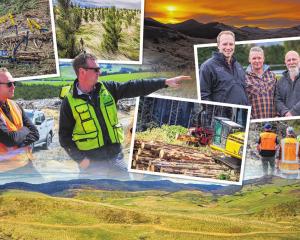
A nearly 16ha orchard of 2700 trees owned by New Zealand Walnut Industry Group researcher Dr Heather North and Clive Marsh is now at this stage.
Their Lincoln orchard, first planted in about 2000, is the region’s most mature commercial operation, but other orchards of 30ha and 40ha are approaching full growth.
Now that commercial operations and processing facilities are in place, the industry group and Walnuts New Zealand Co-operative is looking to bring in new growers.
Small harvests from year six of planting build up to full production at 16 to 20 years, when the trees have full canopies.
Dr North said developing an orchard to a crop-bearing stage was a long-term project and many growers had off-farm jobs, at least in the early years.

"It was only 10 years ago we brought the first mechanised harvester into New Zealand and now there’s a good range for different sized orchards. It feels like we have all the pieces of the puzzle now in place — we have the co-op, the machinery and know-how to grow the trees. There’s still a lot to learn and develop, but we have a set of knowledge to hand on to new growers."
She said the future was bright with a trial of new varieties — particularly Lara — brought in from overseas breeding programmes looking higher yielding than locally sourced Rex or Meyric.
The co-op based at West Melton is owned by 46 shareholders and processes and markets walnuts under the Trickett’s Grove brand.
Over recent harvests, more than 200 tonnes of the nuts have been processed.
The North and Marsh orchard contributes about 30 to 45 tonnes a year to this total, depending on the growing season.

When fixed costs and working expenses were removed, the operating surplus was just under $2800/ha.
Scientists have told growers the revenue sits between a vineyard and sheep and beef finishing farm.
Dr North said their orchard had been "in the black" since 2014.
"We have been at full production since year 17 and we have certainly been profitable for a few years. There are other orchards getting to that. We are quite pleased to get to that stage and it shows it is profitable once you are at full production. It’s a long-term crop, but once you get there you have your trees for many decades to come."
Two larger orchards would soon pass them and bring real scale to the industry, she said.
She said drying facilities and harvesters were expensive investments.

Walnut growers estimate the set-up costs for planting trees and shelter, spraying and irrigation is about $14,800/ha.
Budgets should later include about $100,000 for washing and drying equipment, $85,000 for a harvester, $15,000 for a tractor, $12,000 for a tree shaker. These and other items will come at a total cost of about $270,000.
Dr North said there were non-financial values such as living among trees in a beautiful place, producing healthy food and being part of a relatively new industry.
She said the trees required little fertiliser or spraying for blight and new research showed orchards had low greenhouse gas emissions compared with many crops.
"We felt that walnut orchards would be pretty low in emissions and might be even carbon neutral. It’s early days yet, but it looks like our emissions are offset by the carbon sequestration in our trees."
She said growers used to hear stories of walnut trees being ripped up to make way for horses, but this was no longer the case because it was now known as an industry with a market.














